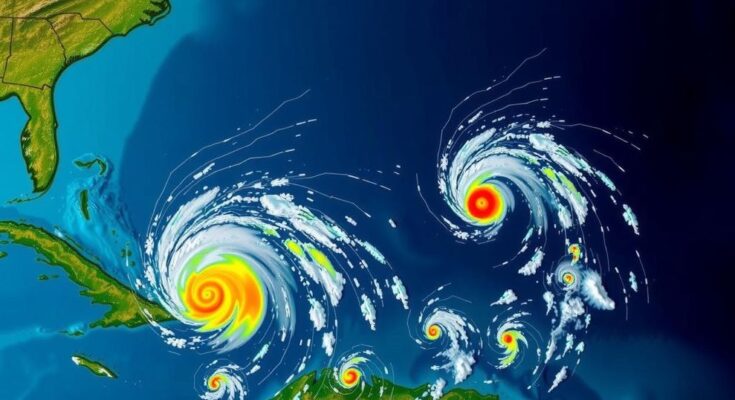The 2024 Atlantic hurricane season concluded with 18 named storms, 11 hurricanes, and five major hurricanes, despite a lull in activity mid-season. Early storms caused significant destruction, particularly Hurricane Helene, which was the deadliest since Katrina. Climate change has been linked to intensified winds and rainfall in hurricanes, highlighting increasing risks for future seasons.
The 2024 Atlantic hurricane season is concluding, having exhibited significant activity, with 18 named tropical storms, 11 escalating to hurricanes, and five achieving major hurricane status, categorized as three or above. Though some records were equaled or surpassed, activity was uneven, marked by an unexpectedly subdued peak in the middle of the season. Pre-season forecasts predicted an extraordinary hurricane season,
evidenced early on by Hurricane Beryl, which became the earliest category five hurricane on record on July 2, leading to widespread devastation in the Caribbean and southern Texas.
Following Beryl, the season experienced a lull until Hurricane Helene materialized on September 24, after only four named storms were recorded since July. Despite elevated sea temperatures and the anticipated breakdown of the El Niño phenomenon, the season’s quiet phase resulted from a shift in weather patterns that inhibited storm formation in typically favorable regions.
Hurricane Helene significantly impacted the southeastern United States, marking the deadliest hurricane on the continent since Hurricane Katrina in 2005, causing over 150 fatalities. The formation of Hurricane Milton in early October epitomized rapid intensification, with wind speeds soaring by 90 mph within 24 hours. Although Tropical Storm Sara, the final storm, did not reach hurricane status, it caused extensive flooding in Central America, particularly in Honduras where over three feet of rain fell. The link between elevated sea temperatures and climate change was evident, with analysis indicating such temperatures have risen roughly 1°C above the 1991-2020 average, amplifying the severity of storms. Studies suggest that climate change has affected wind speeds and rainfall associated with hurricanes, making future storms increasingly perilous.
The Atlantic hurricane season, which spans from June 1 to November 30, typically witnesses peaks in activity around early September. The season’s progress is often subject to predictions based on climatic conditions, such as ocean temperature and prevailing weather patterns. This analysis of the 2024 season highlights significant developments and anomalies, revealing how climate change may be influencing hurricane behavior and intensity. Understanding these trends is vital for preparedness and risk management in vulnerable regions.
The 2024 Atlantic hurricane season has been notably active despite an initial lull. The season was characterized by significant storms including Hurricane Beryl and Hurricane Helene, both of which caused extensive damage and loss of life. The implications of climate change on storm intensity and frequency underscore the need for enhanced preparedness as the overarching patterns of climate continue to evolve, presenting mounting challenges for communities along the Atlantic coast.
Original Source: www.bbc.com




